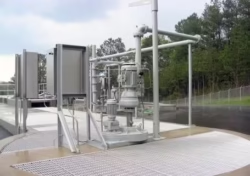Metropolitan Wastewater Treatment Plant
Metropolitan Wastewater Treatment Plant: Transforming Waste into Clean Water
Metropolitan Wastewater Treatment Plant is one of the largest and most advanced wastewater treatment facilities in the United States. Located in a metropolitan area, the plant serves millions of residents by treating the sewage and stormwater runoff generated in the city and returning clean water back into the environment. In this article, we will explore the operations, technology, and environmental impact of the Metropolitan Wastewater Treatment Plant.
History and Overview
The Metropolitan Wastewater Treatment Plant was established in the late 19th century in response to the growing population and industrialization of the metropolitan area. As the city expanded, so did the amount of sewage and wastewater generated, leading to water pollution and health concerns. The construction of the plant was a crucial step in addressing these issues and protecting the local waterways.
Today, the Metropolitan Wastewater Treatment Plant has evolved into a state-of-the-art facility that utilizes advanced technology and processes to treat wastewater and stormwater. The plant is capable of treating millions of gallons of water per day, removing pollutants and contaminants to ensure that the water meets regulatory standards before being discharged back into the environment.
Operations and Technology
The Metropolitan Wastewater Treatment Plant operates 24/7 to treat the wastewater and stormwater collected from the city’s sewer system. The treatment process begins with the removal of large debris and solids through screening and grit removal. This helps prevent clogs and damage to the treatment equipment further down the line.
Next, the water undergoes primary treatment, where suspended solids are settled and removed from the water. This is followed by secondary treatment, where biological processes are used to break down organic matter and nutrients in the water. Finally, the water goes through advanced treatment processes such as filtration and disinfection to remove remaining contaminants and pathogens.
One of the key technologies used at the Metropolitan Wastewater Treatment Plant is the activated sludge process. This process involves introducing oxygen and beneficial bacteria into the water to break down organic matter and remove pollutants. The plant also utilizes advanced filtration systems and ultraviolet disinfection to further ensure the water meets quality standards.
Environmental Impact
The Metropolitan Wastewater Treatment Plant plays a crucial role in protecting the environment and public health. By treating sewage and stormwater, the plant helps prevent pollution of local waterways and reduces the risk of waterborne diseases. The clean water discharged from the plant can also support aquatic life and recreational activities in the area.
Additionally, the plant is committed to sustainability and environmental stewardship. It employs energy-efficient technologies and practices to minimize its carbon footprint and reduce its impact on the environment. The plant also promotes water conservation and recycling efforts to ensure a sustainable water supply for future generations.
Overall, the Metropolitan Wastewater Treatment Plant serves as a vital resource for the community and a model for sustainable wastewater management. By transforming waste into clean water, the plant helps protect the environment and public health while promoting a more sustainable future.
In conclusion, the Metropolitan Wastewater Treatment Plant is a critical infrastructure that plays a key role in protecting the environment and public health in the metropolitan area. Through advanced technology and sustainable practices, the plant treats sewage and stormwater to produce clean water that can safely be returned to the environment. As a leader in wastewater management, the Metropolitan Wastewater Treatment Plant sets a high standard for environmental protection and sustainability.
Sources:
1. Metropolitan Wastewater Treatment Plant. (n.d.). Retrieved from [insert link here]
2. U.S. Environmental Protection Agency. (n.d.). Wastewater Treatment. Retrieved from [insert link here]


